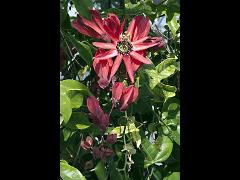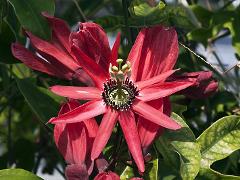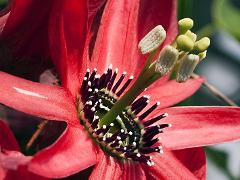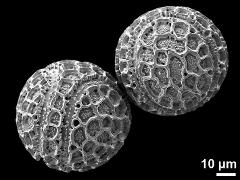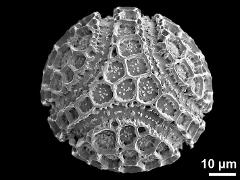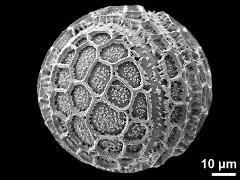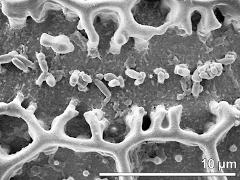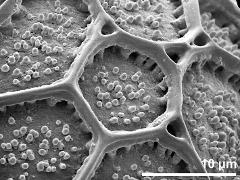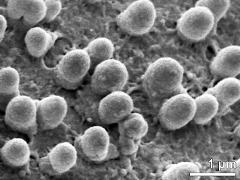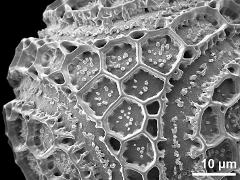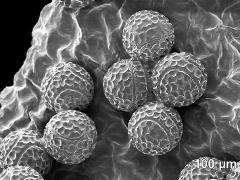Passiflora racemosa
Taxonomy: Angiospermae, Malpighiales, Passifloraceae, Passiflora
Published: 2020-10-05
Pollen Description
Shape, Size and Aperture
pollen unit: monad, dispersal unit and peculiarities: monad, size (pollen unit): large (51-100 µm), size of hydrated pollen (LM): -, shortest polar axis in equatorial view (LM): -, longest polar axis in equatorial view (LM): -, shortest diameter in equatorial or polar view (LM): -, longest diameter in equatorial or polar view (LM): -, pollen class: porate, polarity: isopolar, P/E-ratio: -, shape: spheroidal, outline in polar view: circular, dominant orientation (LM): -, P/E-ratio (dry pollen): -, shape (dry pollen): spheroidal, outline in polar view (dry pollen): circular, infoldings (dry pollen): not infolded, aperture number: 3, aperture type: ring-like aperture, aperture condition: -, aperture peculiarities: aperture membrane ornamented
Ornamentation and Structure
LM ornamentation LM: -, nexine: -, sexine: -, SEM ornamentation SEM: free-standing columellae, reticulate, suprasculpture SEM: -, TEM tectum: -, infratectum: -, foot layer: -, endexine: -, intine: -, wall peculiarities: -, supratectal element: -
Miscellaneous
pollen coatings: -, reserves in cytoplasm: -, cell number: -, Ubisch bodies: -
Annotations: apertural situation: 3 ring-like apertures or 3 large pores with opercula
Author(s) of diagnosis: Halbritter, Heidemarie
Pictures
Picture legend
- flower(s), photographer: Buchner, R.
- flower(s), photographer: Buchner, R.
- flower(s), photographer: Buchner, R.
- hydrated pollen grains - fresh, rehydration (water) & critical point dried & sputter coated with gold, photographer: Halbritter, H.
- polar view - fresh, rehydration (water) & critical point dried & sputter coated with gold, photographer: Halbritter, H.
- equatorial view (oblique) - fresh, rehydration (water) & critical point dried & sputter coated with gold, photographer: Halbritter, H.
- detail of aperture - fresh, rehydration (water) & critical point dried & sputter coated with gold, photographer: Halbritter, H.
- exine surface - fresh, rehydration (water) & critical point dried & sputter coated with gold, photographer: Halbritter, H.
- detail of exine surface - fresh, rehydration (water) & critical point dried & sputter coated with gold, photographer: Halbritter, H.
- polar area - fresh, rehydration (water) & critical point dried & sputter coated with gold, photographer: Halbritter, H.
- dry pollen grains - dry, sputter coated with gold, photographer: Halbritter, H.
Literature
- (2002) Microsporogenesis, microgametogenesis and pollen morphology of Passiflora spp. (Passifloraceae). Bot J Linn Soc 139: 383
- (2000) Development of pollen grain in yellow passion-fruit (Passiflora edulis f. flavicarpa; Passifloraceae). Genet Mol Biol 23: 469-473
- (1998) Preparing living pollen material for scanning electron microscopy using 2,2-dimethoxypropane (DMP) and criticalpoint drying. Biotechnic Histochem 73: 137–143
Copyright and Citation
Cite this publication as:
Halbritter H., Buchner R. 2020. Passiflora racemosa. In: PalDat - A palynological database. https://pc8.botanik.univie.ac.at/pub/Passiflora_racemosa/305835;jsessionid=2C36F05446DC379D68960F2B8FB79FC5; accessed 2025-01-10

